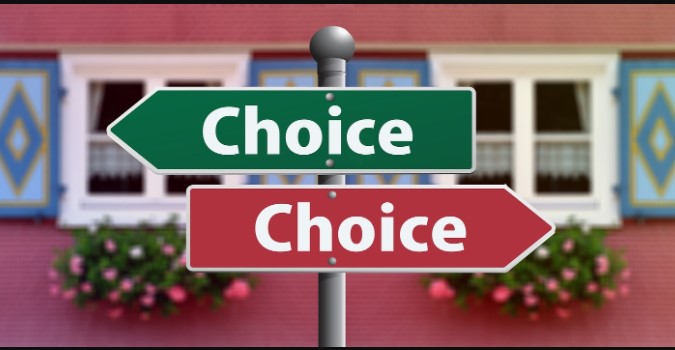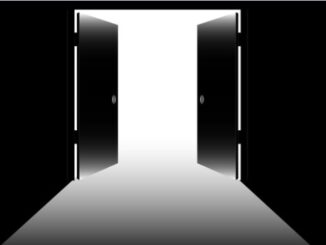
I once heard from a kiruv rabbi that a majority of people he encounters struggle with the question of what is bechira free choice versus bashert Hashem already decided. Many religious people have the same question.
1 – Since Hashem already knows the future, how can a person choose something else?
2 – Since Hashem decides and does everything, bashert – predestined, then how is anything connected to our actions? How can we even choose if everything is predestined from Hashem?
In order to explain how this works, we need to acknowledge several things.
1 – Just because Hashem know what the future will be, this does not automatically mean we cannot choose our path.
In the Torah, we clearly see both sides, Hashem knows the future and we have a choice.
(דברים לא כט) כי ידעתי אחרי מותי כי השחת תשחתון וסרתם מן הדרך אשר צויתי אתכם וקראת אתכם הרעה באחרית הימים כי תעשו את הרע בעיני יהוה להכעיסו במעשה ידיכם
(דברים ל טו) ראה נתתי לפניך היום את החיים ואת הטוב ואת המות ואת הרע
2 – Hashem does not have any past, present, or future. Hashem is not restricted in time. Hashem is the one who created the time. Therefore, for Hashem, The past and the future are one and the same. Since the past and the future are one and the same, of course Hashem know what will happen, as the future is just like the past.
However, this does not mean that we don’t have a choice on which path to go, good or evil. Just because Hashem knows what we will choose this does not take away from us the free choice.
Think about this. A child is standing outside an ice cream store and watches a man entering the establishment. After 20 minutes, the man exits with a chocolate ice cream cone. The child says to his friend, this man did not have a choice which flavor ice cream to buy, since I already know that he chose the chocolate flavor ice cream. The child assumes that because he sees the process and knows the outcome, that means that the man did not have the freedom to choose the flavor.
A child went to the ice cream store with his uncle and waited outside the store with a friend. While waiting, the child tells his friend, I know that my uncle will choose a chocolate ice cream as chocolate is his favorite flavor. The friend responds that there is a new flavor in the store and I think he will choose to try that one. The uncle exits the establishment with a chocolate ice cream cone. Would we assume that since his nephew already knew that his uncle will choose chocolate ice cream that the man did not have the freedom to choose which flavor he wanted to buy this time? Of course he had the freedom to choose what he wanted while he was inside the store. However, the nephew knows his uncle so well that he already knew what he will choose.
The same is with our relationship with Hashem, He created us, He knows what is in our hearts and minds, therefore, knows what we will choose. A righteous person will choose good while a wicked person will choose evil. Hashem is, was, and will always be (see the article life is like a seesaw), therefore, yes, we have bechira, freedom to choose, how to live our lives even though Hashem knows what we will choose.
Think about an author of a novel or a movie scriptwriter. When you read a book or watch a movie, you can go to the end to see the outcome the author chose before reading the entire book or watching the entire movie. Would you say that the author or scriptwriter did not have the freedom to choose the outcome, since you already know the end of the story? No. The author or scriptwriter had every opportunity to choose any storyline and ending, they had the freedom to choose every line and every story plot they wanted, despite the fact that you now know what they chose.
Hashem created the world according to His will. Hashem put into the nature of the world so that we have the freedom to write certain chapters of our lives according to our will. These chapters are our mitzvot and aveirot, which is not bashert, predestined, but totally our free will and choice. The outcome of our life’s story is directly impacted by our own actions and story lines that we choose.
We sometime hear educators describe our relationship with Hashem as being a puppet show, where Hashem pulls all the strings like a puppet master does at a puppet show. This leads to a lot of confusion, falsehoods and hopelessness. If we are like puppets, and we have no control of movement or action, then where and how do we have freedom to do or choose anything in our lives?
The Torah tells us that this is not the case:
Everything is from Hashem except for yirat shamayim (fear of heaven).
(ברכות לג ב) אמר רבי חנינא הכל בידי שמים חוץ מיראת שמים שנאמר (דברים י יב) ועתה ישראל מה ה’ אלהיך שואל מעמך כי אם ליראה
In his introduction to Pirkei Avot שמונה פרקים פרק ח (The Eight Chapters of Maimonides on Ethics), the Rambam explains this concept in detail and very clearly. He writes that by the word “all” (הכל), the Rabbis meant to designate only natural phenomena which are not influenced by the will of man, such as whether a person is tall or short, whether it is rainy or dry, whether the air is pure or impure, and all other such things that happen in the world, which have no connection with man’s conduct, but everything else is on us to make a decision.
ומה שאמרו: “הכל בידי שמים” – לא אמרו זה אלא על הדברים הטבעיים, שאין לאדם בחירה בהן, כגון שיהיה ארוך או קצר; או ירידת הגשמים או עצירתם, או קלקול האוויר או צחותו, וכיוצא בזה מכל מה שבעולם. אך לא על תנועות האדם ומנוחותיו.
The Rambam explains that anything that involves human behavior is either a mitzva or an aveira, and therefore, it is our all bechira and not bashert. Anything that a person has the ability to influence, he has free will to choose as he pleases and it is not bashert. The responsibility and the results of those actions are therefore on us.
As the Gemarah says:
(מכות י ב) אמר רבה בר רב הונא אמר רב הונא ואמרי לה אמר רב הונא אמר רבי אליעזר מן התורה ומן הנביאים ומן הכתובים בדרך שאדם רוצה לילך בה מוליכין אותו מן התורה דכתיב (במדבר כב יב) לא תלך עמהם וכתיב (במדבר כב כ) קום לך אתם
On the path that a person wants to go, Hashem enables them.
Hashem has His will and desires, but He gave us the ability to override His will with our will. Hashem created the world this way so that he can reward us when we choose to follow Him and do good.
(דברים ל יט) העידתי בכם היום את השמים ואת הארץ החיים והמות נתתי לפניך הברכה והקללה ובחרת בחיים למען תחיה אתה וזרעך
The Rambam points to 3 specific examples that are not bashert, but totally our choice: shidduchim, stealing money and murder.
The Rambam says that if we say that the time of death is bashert, then why is a murderer punished? Shouldn’t they be exempt on the account that Hashem wanted it to happen and the suspect was just the messenger of Hashem to end the victim’s life? The Rambam responds that this is not the case. The murderer had the freedom to choose to kill. The Torah discusses this idea that when a person puts himself in a dangerous situation, then he can bring death upon himself, and he is מתחייב בנפשו even though his time to die has not arrived yet, in such a case a person would need a special heavenly merit to be saved.
(חגיגה ה א) אמר ליה רב ביבי בר אביי אית לכו רשותא למיעבד הכי אמר ליה ולא כתיב (משלי יג כג) ויש נספה בלא משפט
In regard to marriage, the Rambam says that if marriage is bashert, then how can a Kohen be punished for marrying a divorced woman? How can a man be punished for marrying his sister? After all, isn’t Hashem the one who set up the arrangement for this marriage? He explains that since getting married is a mitzva and there are laws regarding marriages that are allowed and others that are forbidden, such as marrying certain family members or arranging a marriage for a son or daughter without their consent or full agreement, forcing a marriage against someone’s free will, which the Torah does not view it as a legitimate marriage, therefore, the Rambam says, marriages are not bashert, but rather our choice who we want to marry.
If a shidduch was bashert, and we had no choice, then we would have taken the first person who Hashem sent our way who said yes to us.
In addition, the Rambam says that the same is with money. A person cannot steal from others and say well money is bashert, if the money wasn’t meant for me, I would not be able to steal from him, so therefore I should not be punished because it was Hashem’s plan all along. Since it includes our actions, we have freedom to choose if we want to do honest business or not, be wicked or righteous.
If a person chooses to lie, cheat or steal to get rich quick, they may become rich and be prosperous. However, in the end, he will suffer the consequences, which can include jail time or lose it all one way or another, either by the law of the land where he will be arrested, or he will be punished by Hashem. If a parent feeds, clothes and or houses their children with money received by non-kosher means, they may see their children suffering in a variety of ways. This suffering was not bashert, but rather a direct result of the parents’ evil actions.
The Torah has specific guidelines on how to do business, all the dos and don’ts are clear. However, we have freedom to choose if we want to follow the Torah rules or not. We will receive reward or punishment based on the path we choose for ourselves.
Regarding the victims, in some cases, the Torah says that Hashem uses bad people to carry out the plan of what needed to happen.
(שמואל א כד יג) כאשר יאמר משל הקדמני מרשעים יצא רשע וידי לא תהיה בך
Other times we see that the free will of one person caused irreversible suffering and the death of others.
(סנהדרין קד א) אמר רב יהודה אמר רב אלמלי הלווהו יהונתן לדוד שתי ככרות לחם לא נהרגה נוב עיר הכהנים ולא נטרד דואג האדמי ולא נהרג שאול ושלשת בניו
When we suffer, how can we know if the suffering is as a result of punishment for the bad we did or due to it being a test from Hashem? If we are suffering unnaturally, we should look at our actions and see if it is מידה כנגד מידה, since Hashem rewards and punishes a person with the same type of action the person took.
(משנה סוטה א ז) במידה שאדם מודד, בה מודדין לו. היא קישטה את עצמה לעבירה, המקום ניוולה.
If we find a bad deed in the past which matches the bad punishment, then yes, we know it is a punishment from Hashem over our actions, but if you see no parallel of something we have done wrong, then we know it is a test from Hashem.
Example: If you lose money unnaturally, look at your business dealings and see if you earned it in a Torah way, if questionable dealings were involved, then you know that it was a punishment from Hashem to rectify that, otherwise, it is a test from Hashem.
The Rambam says that nearly 100 percent of health issues is our own doing due to our bad eating habits and unhealthy lifestyle and is not bashert and we were not just born to be fat and unhealthy. He explains that we must eat healthy, exercise regularly, go to doctors for regular check-ups and follow doctors advice so that we do not sabotage our own health and cause our own suffering or premature death as a result.
(רמב”ם הלכות דעות ד כ) רוב החולאים הבאים על האדם, אינן אלא מפני מאכלים רעים, או מפני שהוא ממלא בטנו ואוכל אכילה גסה, אפילו ממאכלים טובים. הוא ששלמה אומר בחכמתו, “שומר פיו, ולשונו שומר מצרות, נפשו” (משלי כא כג) כלומר שומר פיו מלאכול מאכל רע או מלשבוע, ולשונו מלדבר אלא בצרכיו.
Hashem tells us to live in Israel, a mitzvah, but he gave us the bechira, freedom to choose, where to live and how to raise our children, which circles we want to associate with and where and how to educate our children. When our children grow up, they have a right to choose where and how they want to live. We make each of these decisions out of our free will. Our lives, the lives of our children, their shidduchim and their future will be impacted by every one of these decisions.
Anything that is related to doing mitzvot is on us, it is our free will and not bashert. Hashem is our creator, He knows us and our strengths and weaknesses, and He created us with our unique natures and all the tools we need to work on ourselves to be the best version of what He created us to be. We have the freedom to choose if we want to use our nature and tools for good or bad.
Example: Hashem created grapes for our pleasure and good health. Hashem commanded us to drink red wine and meat as part of our oneg Shabbat and Chaggim. If a person decides to drink and drive drunk, and then gets arrested, they can’t say oh it was just bashert for me to suffer, and the suffering would have happened anyway regardless of my actions. When a person uses their free will to drink and drive drunk, their actions alone will determine the direction of their life.
In addition, the Gemarah says that there is no such thing as luck for Jewish people. We cannot attribute anything that happens to good luck or bad luck.
שבת קנו א דא”ר יוחנן מניין שאין מזל לישראל שנאמר (ירמיהו י, ב) כה אמר ה’ אל דרך הגוים אל תלמדו ומאותות השמים אל תחתו כי יחתו הגוים מהמה הם יחתו ולא ישראל ואף רב סבר אין מזל לישראל דאמר רב יהודה אמר רב מניין שאין מזל לישראל שנאמר (בראשית טו, ה) ויוצא אותו החוצה אמר אברהם לפני הקב”ה רבש”ע (בראשית טו, ג) בן ביתי יורש אותי אמר לו לאו (בראשית טו, ד) כי אם אשר יצא ממעיך אמר לפניו רבש”ע נסתכלתי באיצטגנינות שלי ואיני ראוי להוליד בן אמר ליה צא מאיצטגנינות שלך שאין מזל לישראל


